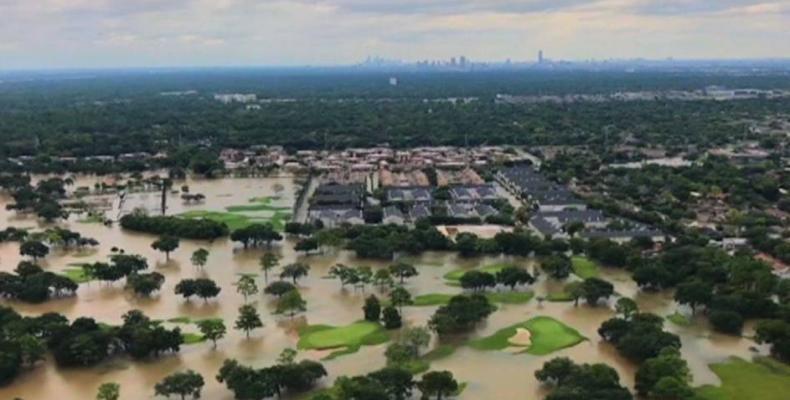Houston, September 7 (RHC)-- Hurricane Harvey-affected Texas continues to face a quagmire of issues as the affected areas continue to face health and relief-related problems in the aftermath.
Three Texas churches that suffered serious damage in Hurricane Harvey, have sued the Federal Emergency Management Agency, FEMA, for refusing to provide disaster relief to houses of worship because of their religious status.
The churches said in a complaint filed Monday, calling their claims "futile," the churches said FEMA’s public assistance program “categorically” excludes their claims, violating their constitutional right to freely exercise their religion.
The churches said FEMA's ban contradicts a recent U.S. Supreme Court decision making it easier for religious groups to get public aid, referring to a recent Supreme Court decision, Trinity Lutheran Church of Columbia Inc vs. Comer, that asserted the U.S. states must sometimes provide relief-related aid even though their constitutions explicitly ban such funding.
“States and the federal government are different, but the First Amendment applies the same to both,” according to Daniel Blomberg, a lawyer for Becket, a non-profit that advocates for religious freedoms and represents the churches.
“The principle is that governments can’t discriminate on the basis of religious status, and that is unapologetically what FEMA is doing here.” The three churches, he added, “need emergency repair now.”
On the other hand, the excessive flooding in Texas has opened up a series of health-related issues in the regions affected by the hurricane. The Centers for Disease Control and Prevention have issued warnings against walking in floodwater as sharp metal bits or glass shards may lurk below.
Texas health officials have urged people to get tetanus booster shots to protect themselves against the disease, that can enter bodies through cuts. Though the storm is passing and the waters will eventually recede, the dangers from floodwaters are expected to stay on.
“I distill it down to short term, long term, and big picture,” Peter Hotez, dean of the National School of Tropical Medicine at Houston's Baylor College of Medicine, told the Washington Post.
"Certainly the conditions here could promote cholera,” Hotez said, “but you’d have to have somebody infected with cholera coming into the area."
Health officials are preparing a "mega-shelter" in the Dallas Convention Center to house 5,000 people — and evacuees are at higher risk of getting sick, Hotez said. During Katrina, there were respiratory infections among people in shelters, including an apparent uptick in tuberculosis.
Floodwaters can also draw out unwelcome wild animals and reptiles such as snakes. Images of stinging fire ants clumped together the size of large floating rafts were spotted Monday.
Hurricane Harvey-Affected Areas Now Face Health and Relief-Related Issues

Related Articles
Commentaries
MAKE A COMMENT
All fields requiredMore Views
- Trump reportedly orders military to draw up plans to seize Panama Canal
- Ecuador's Electoral Debate: Luisa González urges Noboa not to lie to the people and keep his campaign promises
- Bolivia demands sovereign access to the sea and begins a new stage in relationship with Chile
- Thousands of protesters in Spain call for a boycott of Israel and an end to genocidal attacks on Gaza
- Cuba to play women's soccer friendlies against Peru

